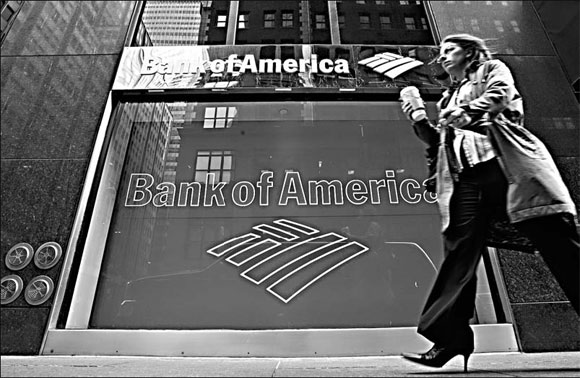US lender says net income fell 77%
|
A woman passes a Bank of America branch in New York. Bloomberg News |
Bank of America Corp, the second-largest US bank, said profit dropped for a third straight quarter as the company set aside $6.01 billion for bad loans.
First-quarter net income declined 77 percent to $1.21 billion from $5.26 billion, the Charlotte, North Carolina-based company said yesterday in a statement. Results included $1.31 billion in trading losses and $2.72 billion in costs for uncollectible loans. Earnings per share fell to 23 cents from $1.16 a year earlier, compared with the 41-cent estimate of 21 analysts surveyed by Bloomberg.
The slide casts doubt on Chief Executive Officer Kenneth Lewis' goal to increase profit by at least 20 percent this year. The bank's consumer unit, which contributed more than 60 percent of operating income in 2007, faces a nationwide jump in unpaid debt and the highest unemployment rate since 2005. Overdue US credit-card bills are the most in more than three years and foreclosures soared 57 percent in March.
"The decline in housing prices has to be solved for things to get better," said Chris Hagedorn, portfolio manager at Fifth Third Asset Management in Cincinnati, in an interview before earnings were disclosed. "In terms of the maximum point of pain, I don't think we're there yet." Fifth Third manages $22 billion and owns Bank of America shares.
Revenue fell 6 percent to $17.3 billion. Profit decreased 59 percent to $1.09 billion in the consumer and small business unit, and dropped 92 percent to $115 million at the corporate and investment bank.
"These results clearly did not meet our expectations," Lewis said in the statement. "The weakness in the economy and prolonged disruptions in the capital markets took their toll on our performance."
Citigroup Inc, the biggest US bank by assets, reported a first-quarter loss last week of $5.1 billion, smaller than analysts' most pessimistic estimates. JPMorgan Chase & Co, ranked third, said earnings declined 50 percent. Both are based in New York. Wachovia Corp, ranked fourth and based in Charlotte, posted an unexpected loss of $393 million.
Bank of America closed at $38.56 a share in New York Stock Exchange composite trading on April 18. The stock slid 8.1 percent in the first quarter, compared with JPMorgan's 1.6 percent drop and Citigroup's 27 percent decline. The 24-member KBW Bank Index dropped 11 percent. Bank of America supplanted Citigroup last year as the largest US bank by market value, and issued more credit cards than any of its domestic competitors.
Countrywide purchase
"Investors aren't looking for heroics," said Nancy Bush, an independent bank analyst in Aiken, South Carolina, before results were released. "They want to hear the bank say the end of the pain is near, and they don't have to cut the dividend."
Bank of America will move deeper into the mortgage business when it acquires Calabasas, California-based Countrywide Financial Corp, the biggest US home lender. The stock-swap transaction, originally valued at about $4 billion and scheduled to be completed in the third quarter, gives Bank of America a role in one out of every four home loans in the nation. Countrywide, with losses of $1.6 billion over the past two quarters, is scheduled to report quarterly results on April 29.
The world's biggest banks and brokerages have disclosed more than $250 billion of writedowns and credit losses since June because of collapsing prices in US mortgage markets. They've raised more than $160 billion to replenish capital, with Bank of America tapping public investors for at least $13 billion after writedowns and credit losses that totaled at least $8.2 billion before yesterday, according to data compiled by Bloomberg.
Late payments in the bank's $81 billion credit-card portfolio may have reached 5.8 percent as of Feb 29, compared with an industry average of 4.1 percent, according to data compiled by Bloomberg on securitized loans.
"Bank of America is doing everything possible to determine how much they think they might lose over the next year or two and take as much of that upfront as possible," Richard Bove, an analyst at Punk Ziegel & Co, said. "The problem that they face, however, is that there is continued erosion in the housing markets."
Assuming 2 percent of the bank's home-equity loans are uncollectible this year, the cost may be $2.3 billion, Fitch Ratings analyst John Mackerey said in a March 14 report.
Agencies
(China Daily 04/22/2008 page17)















